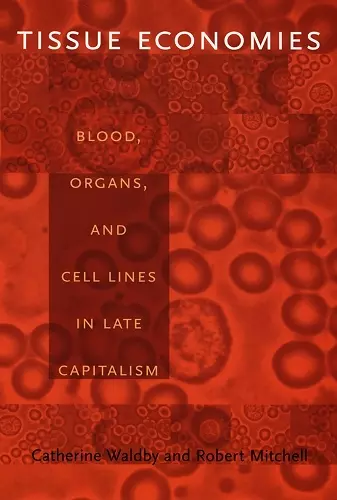Tissue Economies
Blood, Organs, and Cell Lines in Late Capitalism
Robert Mitchell author Catherine Waldby author
Format:Hardback
Publisher:Duke University Press
Published:20th Mar '06
Currently unavailable, and unfortunately no date known when it will be back

A survey of the rapidly expanding economies of exchange in human blood, tissues, and organs, explaining the complex issues at stake and suggesting likely developments
Surveys the economies of exchange in human blood, tissues, and organs. This book compares tissue economies in the United Kingdom and United States. It features a series of case studies based on particular forms of tissue exchange and also considers the impact of different models of biotechnology patents on tissue economies.As new medical technologies are developed, more and more human tissues—such as skin, bones, heart valves, embryos, and stem cell lines—are stored and distributed for therapeutic and research purposes. The accelerating circulation of human tissue fragments raises profound social and ethical concerns related to who donates or sells bodily tissue, who receives it, and who profits—or does not—from the transaction. Catherine Waldby and Robert Mitchell survey the rapidly expanding economies of exchange in human tissue, explaining the complex questions raised and suggesting likely developments. Comparing contemporary tissue economies in the United Kingdom and United States, they explore and complicate the distinction that has dominated practice and policy for several decades: the distinction between tissue as a gift to be exchanged in a transaction separate from the commercial market and tissue as a commodity to be traded for profit.
Waldby and Mitchell pull together a prodigious amount of research—involving policy reports and scientific papers, operating manuals, legal decisions, interviews, journalism, and Congressional testimony—to offer a series of case studies based on particular forms of tissue exchange. They examine the effect of threats of contamination—from HIV and other pathogens—on blood banks’ understandings of the gift/commodity relationship; the growth of autologous economies, in which individuals bank their tissues for their own use; the creation of the United Kingdom’s Stem Cell bank, which facilitates the donation of embryos for stem cell development; and the legal and financial repercussions of designating some tissues “hospital waste.” They also consider the impact of different models of biotechnology patents on tissue economies and the relationship between experimental therapies to regenerate damaged or degenerated tissues and calls for a legal, for-profit market in organs. Ultimately, Waldby and Mitchell conclude that scientific technologies, the globalization of tissue exchange, and recent anthropological, sociological, and legal thinking have blurred any strict line separating donations from the incursion of market values into tissue economies.
“Tissue Economies asks us to think about biological materials as inseparable from the networks of exchange, gift, and excess that condition their value to us. Catherine Waldby and Robert Mitchell show us a new body politic, one in which the organs, tissues, and fluids exist as much outside of and between bodies as they do within them.”—Eugene Thacker, author of The Global Genome: Biotechnology, Politics, and Culture
“Catherine Waldby and Robert Mitchell demonstrate just how shaky are some of the structures underpinning the global politics of human tissue, such as the distinction between gift and commodity, when in late capitalism even tissue originally given altruistically is used as an open source of free tissue for commercial use on a worldwide scale. Yet they refuse the temptation of easy cynicism, asking what better models we can use instead to protect ourselves in the global tissue economy. This is an imaginative, up-to-date, and politically astute book.”—Donna Dickenson, author of Risk and Luck in Medical Ethics
“Catherine Waldby and Robert Mitchell offer a comprehensive analysis of key types of tissue transfer, tracing the networks within which human tissues circulate as waste, gift, and commodity. From their innovative exploration of the way the principle of informed consent has functioned to enable the commodification of tissue products, to their demonstration that conventional frameworks are inadequate for an understanding of contemporary practices of tissue trading, this book is an essential and eye-opening read.”—Susan Merrill Squier, author of Liminal Lives: Imagining the Human at the Frontiers of Biomedicine
“[A] rich and balanced account of the ethical and social implications of tissue transfer and the networks in which such transfers occur. Tissue Economies is a powerful example of the contribution that social science and humanities perspectives can bring to contemporary medical practices. . . . This book will be of interest to the health policy and medical professions for its clarity, comparative case-study approach, and ability to demonstrate, case by case, the inadequacy of the gift/commodity dichotomy.” -- Laura Mamo * JAMA *
“[T]he book offers a wealth of knowledge in relation to biotechnology’s role in contemporary human tissue economies. More than this, by revealing the ways in which advances in biotechnology and biocommunication unfold in and through transforming social institutions (such as public bureaucracies and commercial enterprise, child-bearing, aging, health and welfare systems) Tissue Economies discloses how we are all implicated in the dense webs of meanings, judgments, hopes, and fears that contemporary tissue economies trade on.” -- Ruth McManus * American Journal of Sociology *
ISBN: 9780822337577
Dimensions: unknown
Weight: 485g
240 pages